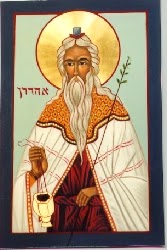Holy Prophet Aaron the High Priest
"Then the Lord said to Aaron, 'And behold, I have given you whatever is kept of the offerings made to me, all the consecrated things of the people of Israel; I have given them to you as a portion, and to your sons as a perpetual due."--Num 18:8
Out of the twelve tribes of the Israel, the descendants of the sons of Jacob, the Lord chose one to be His own. For He said, "The Levites shall be mine: I am the Lord" (Num 3:44). Levi was not among the msot beloved sons of Israel, for of him and his brother Simeon his father said, "Weapons of violence are their swords. O my soul, come not into their council; O my spirit, be not joined to their company; for in their anger they slay men...I will divide them in Jacob and scatter them in Israel" (Gen 49:5-7). Yet despite the violent nature of Levi, his descendants were not always so. While Moses may have been a man of anger at times, Aaron was the servant of God who knew how to speak well, as his brother declared, and to him and his sons the Lord bestowed a great blessing. For to them were entrusted the holy things.
"Every devoted thing is most holy to the Lord" (Lev 27:28). And what is more holy than the offerings made to the Lord? Yet the holiest part of these offerings is bestowed upon the Levites, for instance: "What is left of the cereal offering shall be for Aaron and his sons; it is a most holy part of the offerings by fire to the Lord" (Lev 2:3). Indeed, the Lord declared to Aaron that all of the devoted, holy things are bestowed upon him and his sons: "Every devoted thing in Israel shall be yours" (Num 18:14). To the Levites is given the holy remains of the offerings. To them are given cities for residence out of the inheritances of all the other tribes (cf. 1 Chr 6:54-81). To them are given tithes, "every tithe in Israel for an inheritance, in return for their service which they serve, their service in the tent of meeting" (Num 18:21). To them are given many things out of the possessions of the tribes of Israel, even though the Lord said to Aaron, "You shall have no inheritance in their land, neither shall you have any portion among them: I am your portion and your inheritance among the people of Israel" (Num 18:20). Though the Lord is their portion, He still wished them to be given things of the world to sustain them, offerings and cities and tithes.
If this was so of the priests of the Old Covenant who offered the sacrifice of bulls and goats, how much more does it apply to the priests of the New Covenant, who offer the Body and Blood of the Lord! "The laborer deserves his wages," announced St. Paul, and this applies as much to a country priest as it does to an itinerant missionary (1 Tim 5:18). Should not the laity, then, given of their earthly goods to support the priests? Though their portion is the Lord, they should still be given earthly goods for sustenance. For the great service they render to all the Church and all the world, they deserve wages. Not all priests will be perfect, and yet they are still priests, and, because of the grace of God in them, they should receive their recompense. "Do not consider the merits of the persons, but the office of priests. And if thou lookest at merits, consider the priest as Elijah; look at the merits of Peter, too, or of Paul, who received this mystery from the Lord Jesus, and handed it on to us" (St. Ambrose). If they be ordained priests who entrusted with that great priestly spirit, that priestly gift, then they deserve to be treated as such. As the Israelites gave of their own portion to the Levites to be their portion, so let us not be stingy in giving of our goods to our priests, the new Levites, that they may have their portion. If "God loves a cheerful giver," how much more one cheerfully given to His inheritance, His priests!
"Everyman, God gave priests that dignity,
And setteth them in His stead among us to be;
Thus they are above angels in degree.
Therefore let us priesthood honor."
Christ the Great High Priest
Nota Bene: The quote from St. Ambrose is from his De Mysteriis (On the Mysteries) V.27, found in On the Sacraments and On the Mysteries, translated by T. Thompson and edited by J.H. Srawley (London: Society for Promoting Christian Knowledge, 1950). The final quote is from the medieval morality play Everyman.
Text ©2014
Brandon P. Otto.
Licensed via CC
BY-NC. Feel free to redistribute non-commercially, as long
as credit is given to the author.


No comments:
Post a Comment